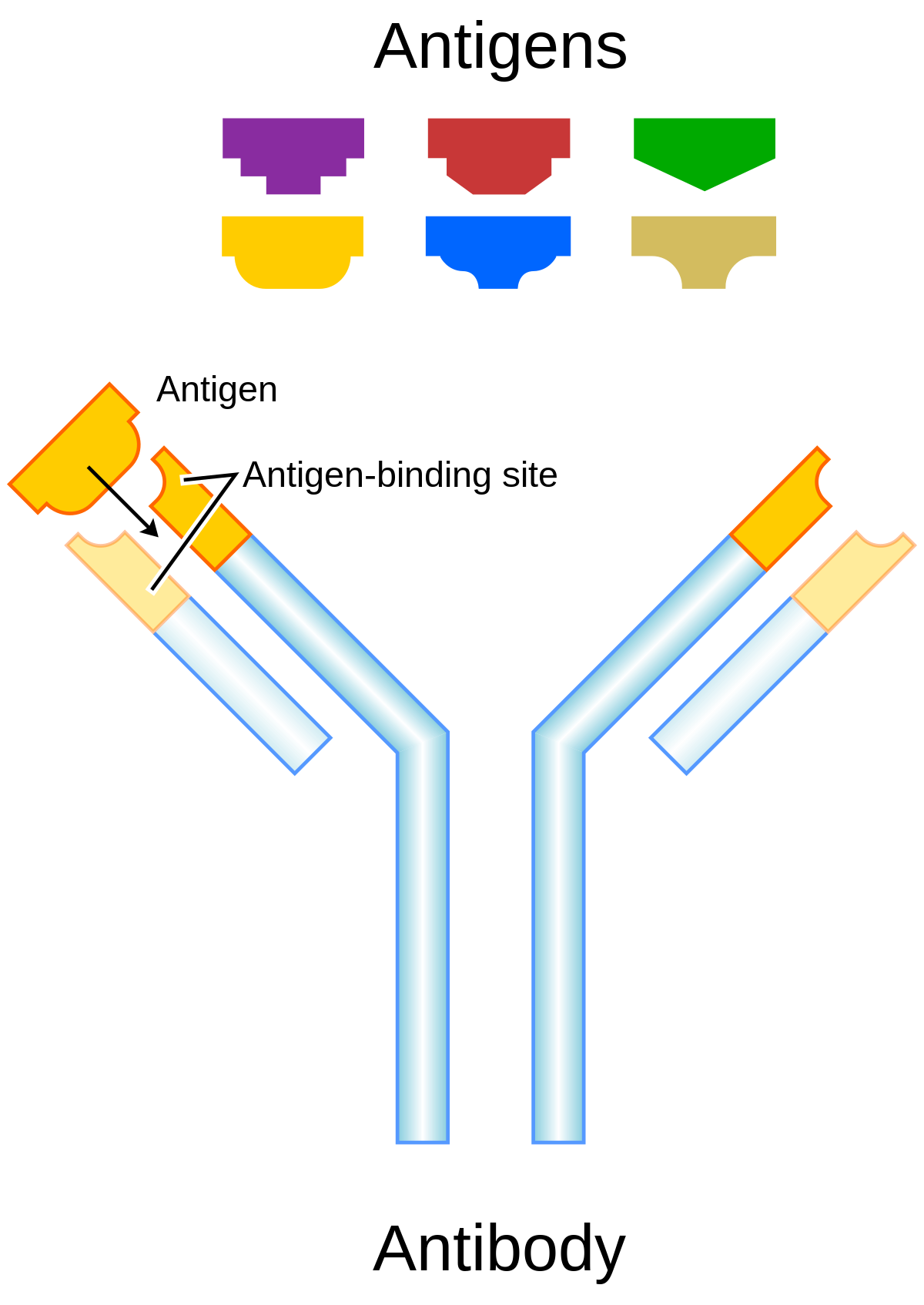Antigen
The immune system, a complex network of cells and molecules, safeguards the body against a constant barrage of foreign invaders like bacteria, viruses, and parasites. Understanding the specific molecules the immune system targets, known as antigens, is fundamental to the field of immunology.
Antigen Recognition: The Foundation of Immunity:
what is an antigen?
Antigens possess unique structural features, termed epitopes, which act like recognition tags. Specialized immune cells, B and T lymphocytes, express receptors that bind specifically to these epitopes. This binding event triggers a cascade of immune responses tailored to eliminate the antigen and the pathogen it might be associated with.

Types of Antigens and Their Significance:
- Foreign Antigens (Heteroantigens): These are molecules entirely foreign to the body, originating from pathogens or foreign substances like pollen. They typically elicit strong immune responses. Understanding these antigens allows for the development of vaccines, which introduce weakened or inactivated pathogens or purified antigens to "train" the immune system to recognize and effectively combat future encounters.
- Self-Antigens (Autoantigens): Normally, the immune system tolerates our own molecules. However, under certain conditions, self-proteins can become modified or misidentified as foreign. This can lead to autoimmune diseases where the immune system attacks healthy tissues. Understanding the mechanisms by which self-tolerance breaks down and self-antigens become a target is crucial for developing treatments for autoimmune disorders.
Beyond Recognition: Functional Consequences of Antigen Understanding:
Deciphering antigens extends far beyond mere recognition. This knowledge empowers researchers to:
- Develop diagnostic tools: Identify specific antigens associated with diseases for early diagnosis and monitoring.
- Design immunotherapies: Engineer molecules that mimic or target specific antigens to stimulate or suppress the immune response for cancer treatment or allergy management.
- Understand immune dysregulation: Decipher how the immune system reacts to or fails to react to different antigens, leading to improved strategies for managing immune deficiencies and allergies.
Antigen understanding is the cornerstone of immunology. It is the key to unlocking the body's defense mechanisms, paving the way for advancements in vaccines, diagnostics, and immunotherapies to combat a wide range of diseases.
For more information about Antigen, here is an explainer video:
The immune system’s ability to recognize and respond to antigens is not static; it must adapt to the ever-evolving landscape of potential threats. This adaptability hinges on the immense variability of antigens, driven by genetic diversity and environmental pressures. Understanding this variability is critical for designing effective immunological interventions.
Genetic Basis of Antigen Diversity
Somatic Hypermutation and Class Switching:
B cells undergo somatic hypermutation in their variable (V) regions, enhancing antibody affinity for specific antigens. Class switching alters the constant (C) region, diversifying the antibody’s effector functions without changing antigen specificity.

Major Histocompatibility Complex (MHC):
MHC molecules are highly polymorphic, ensuring a wide range of antigen presentation capabilities. MHC class I molecules present endogenous antigens to CD8+ T cells, while MHC class II molecules present exogenous antigens to CD4+ T cells. This polymorphism is crucial for the immune system's ability to recognize a broad spectrum of pathogens.

Antigenic Variation in Pathogens
Pathogen Strategies:
Antigenic Drift and Shift in Viruses: Influenza viruses exemplify antigenic drift, where small mutations accumulate over time, and antigenic shift, where genetic reassortment generates new viral strains. Both mechanisms challenge the immune system and complicate vaccine design.
Phase Variation in Bacteria: Bacteria like Neisseria gonorrhoeae alter surface proteins to evade immune detection, a strategy known as phase variation.
Implications for Vaccine Development:
The variability of antigens necessitates the development of vaccines that either target conserved regions of antigens or induce broad-spectrum immunity. Techniques such as reverse vaccinology and structure-based antigen design are pivotal in this endeavor.
Cross-Reactivity and Molecular Mimicry
Cross-Reactivity:
Sometimes, immune responses to one antigen can cross-react with structurally similar antigens. This phenomenon can be beneficial, providing broader protection, or detrimental, leading to autoimmunity.
Molecular Mimicry:
Pathogens may express antigens that mimic host molecules, leading to immune responses that inadvertently target self-tissues. This mechanism is implicated in autoimmune diseases like rheumatic fever, where antibodies against Streptococcus pyogenes cross-react with cardiac tissues.
Emerging Technologies in Antigen Research
Single-Cell Sequencing:
Advances in single-cell sequencing allow for the detailed analysis of B and T cell repertoires, providing insights into the diversity and specificity of immune responses at an unprecedented resolution.
Cryo-Electron Microscopy:
This technology enables the visualization of antigen-antibody interactions at near-atomic resolution, facilitating the design of more precise immunotherapies and vaccines.
Bioinformatics and Machine Learning:
Computational tools are increasingly used to predict antigenic epitopes, analyze genetic variability, and model immune responses. Machine learning algorithms can identify patterns in large datasets, guiding the development of novel immunological interventions.
Antigen variability and the immune system’s ability to adapt to this variability are central to the field of immunology. Continued research into the genetic and structural nuances of antigens, coupled with cutting-edge technologies, promises to enhance our understanding of immune responses and drive innovations in vaccines, diagnostics, and therapeutic strategies.
Maxanim offers a wide variety of antigen-related products. Click here to shop now!
